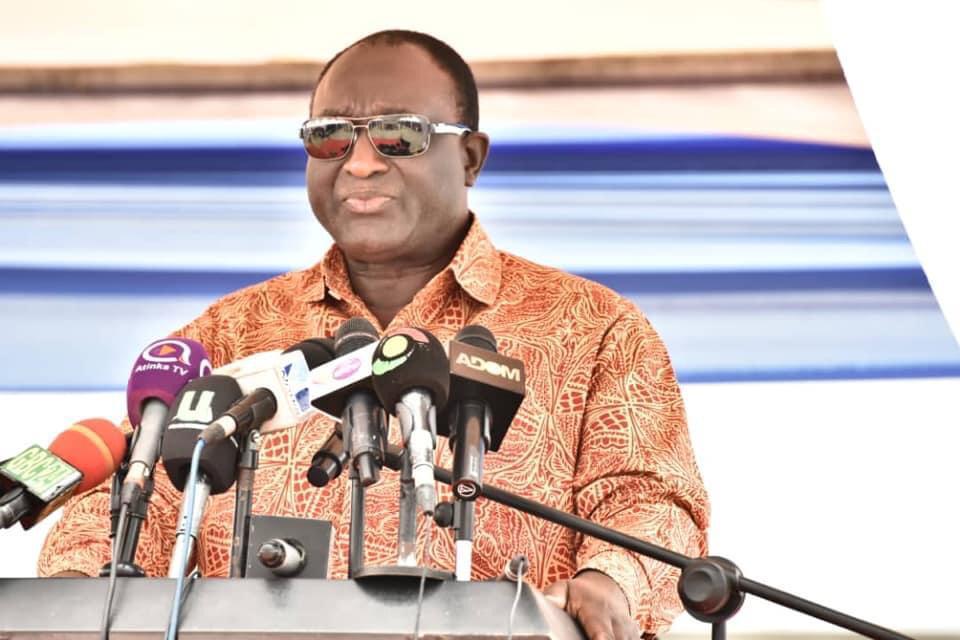
Accra, GHANA – The United States Government, through the U.S. Agency for International Development, and the Ghana Ministry of Industry will host the Ghana Agribusiness Investment Summit November 16-18, 2021. The virtual summit, which opens today, will bring together over 400 stakeholders in the agribusiness sector, transaction advisors, financial institutions, and investors, along with representatives of the United States and Ghana governments, non-governmental organizations, development agencies, and the donor community. The theme for the summit is “Building a Resilient and Sustainable Ecosystem for Agricultural Financing.”
USAID Ghana Mission Director Sharon Cromer joined the Honorable Deputy Minister of Industry, Michael Okyere Baafi to open the summit, which is part of the USAID-supported Feed the Future Ghana Mobilizing Finance in Agriculture (MFA) initiative.
“A more developed Ghana is a stronger trade partner for the United States. We look forward to continuing to support Ghana as it continues along its journey towards prosperity, sustainable growth, and self-reliance in agriculture. Innovative financing tools will be key to mobilizing private capital to support Ghana’s agricultural growth,” said USAID GHANA Mission Director Cromer reaffirming the U.S. Government’s commitment to help Ghanaians move from subsistence farming and low value addition to become a leader in Africa’s agricultural development.
Ghana’s Deputy Minister of Industry, Michael Okyere Baafi, delivering the keynote address noted, “The agriculture sector plays a critical role in Ghana’s broader effort to achieve greater industrialization. Government, in recognition of the sector’s significant contribution to the national industrialization agenda, has introduced programs such as the One-District-One Factory (1D1F) Initiative, a nationwide effort to establish at least one major factory in every district in Ghana.”
The summit connects 60 agribusinesses in the maize, soy, groundnut, cowpea, mango, cashew, shea, and other high-value export crop sectors to international and local investors, financial institutions, and transaction advisors working with the MFA to access investments. These investments will enable the agribusinesses to purchase agricultural inputs and machinery to increase production, improve food security, and stimulate inclusive economic growth. To register for the summit, visit: https://events.hubilo.com/2021-ghana-agribusiness-investment-summit/login
The MFA Activity is a four-year, $19 million activity that will improve access to finance for farmers and agribusinesses in Ghana. Using a two-pronged approach, MFA facilitates access to loans and investment, and helps financial institutions to better understand the agribusiness sector and develop appropriate financial tools for farmers and agribusinesses. The Activity is expected to help 81,493 agricultural enterprises receive $261 million in finance, leading to $500 million in new sales.
About Feed the Future
Feed the Future is the U.S. Government’s initiative to end global hunger. Led by USAID and driven by collaborative partnerships across public and private sectors, including 11 U.S. Government agencies, Feed the Future addresses the root causes of poverty and hunger. This is done by boosting inclusive agriculture-led economic growth, resilience, and nutrition in countries with great need and opportunity for improvement.
About USAID
USAID is the lead U.S. government agency that works to end extreme global poverty and enable resilient, democratic societies to realize their potential. USAID’s activities and strategic partnerships support Ghana’s journey to self-reliance and advance an integrated approach to development. USAID promotes accountability, sustainable systems, and inclusive development.
Remarks by USAID Ghana Mission Director Sharon Cromer
November 16, 2021-As prepared-
Good morning. I’m honored to join you today as we open the Ghana Agribusiness Summit hosted by the USAID-supported Feed the Future Ghana Mobilizing Finance in Agriculture (MFA) Activity.
In May, Ambassador Sullivan launched this initiative as the first of many efforts through our Global Food Security Strategy for Ghana.
This summit brings together the key stakeholders to unlock more than a quarter-billion dollars of agricultural finance over the next three years. Small and large agricultural businesses are here in search of needed capital to purchase more seeds, buy new equipment, and hire new staff. Financial institutions are also here to find new customers and to learn how to profitably invest in the sector. Advisors are here to learn new ways about how they can best serve businesses and to seek out new clients. The development community is here to learn how best to coordinate their programming to empower the Ghanaian people. Government is here to provide support and guidance, and to listen to private sector needs in order to incorporate solutions into future policy. Media is here to spread the word far and wide. We all play an important role.
But being here isn’t enough. The challenges we face are real. The market for agricultural finance in Ghana remains nascent and undeveloped, representing a great opportunity for growth. Although some financial institutions remain reluctant to invest in agriculture, there are exciting opportunities to do so, whether in less developed crops such as cowpea and shea, or by increasing the engagement of women and youth. Business consultants lack the networks and specialist knowledge to effectively advise agribusinesses. And businesses need to build trust among each other to share knowledge about their practices and realize the value that business services, like accounting and long-term strategic planning, can offer. Over the next three days, this interactive summit will feature panels and discussions on topics designed to address these challenges head on. I encourage you to participate in all of them.
The hard work has already begun. To give one example, through MFA, the United States Government linked a transaction advisor, Solutions Agribusiness, to Tumu Cooperative Credit Union to help 24 farmers receive a total of $560,000 in loans so they could buy fertilizer and seeds at a bulk discount. This is a real-world example of this initiative benefitting Ghanaians.
In another example, MFA trained Bawku East Small Scale Farmers Association Rural Bank on how to accurately assess risk in the agriculture sector. The training also provided guidance on how to structure repayments in-terms of timing and size to minimize these risks. As a result, the Bank doubled its lending to farmers and agribusiness.
As a third example, MFA helped John Dimah, a farmer, prepare the loan application and required documents needed to purchase a John Deere tractor. John used this tractor to help 3,500 smallholder farmers prepare land in Sissala West for the planting season. These farmers previously relied on cattle-driven plows and communal labor to cultivate their maize, soy, groundnut, and cowpea.
These types of investments mean that Ghanaian tables will have more food, Ghanaian businesses will earn greater profits, and Ghanaian families will live healthier, more prosperous lives.
There is a risk that the good work accomplished by Ghanaian agricultural professionals may be blunted by the continuing COVID-19 pandemic. The USG continues to help the Government of Ghana to contain COVID-19 to help restore economic activity and strengthen social ties. We have already provided more than 2.5 million COVID-19 vaccine doses to the Government of Ghana and we have partnered with local firms to boost their production of face masks and hand sanitizer. I encourage you and your family members to follow the Ghana Health Services directives and get vaccinated. Vaccines are key to defeating the pandemic and restoring economic growth.
We also know the climate crisis impacts all nations. In response to this crisis, the United States recently announced the Agriculture Innovation Mission for Climate, a pioneering effort by 31 countries including Ghana, to encourage climate-smart agriculture and food systems innovation through private investment and public-private partnerships. The United States looks forward to working with Ghana to protect and secure our shared fragile ecosystems.
While much has been done, there is much yet to do. Today, the U.S. Government reaffirms its commitment to help Ghanaians move from subsistence farming and low value addition to become a leader in Africa’s agricultural development. A more developed Ghana is a stronger trade partner for the United States.
I would like to thank Deputy Minister Michael Okyere Baafi for joining us here at this important summit. I urge all of the agribusiness owners, banks, consultants, and farmers to participate in the upcoming panels, business pitches, and networking. We look forward to continuing to walk alongside Ghana as it continues along its journey towards prosperity, sustainable growth, and self-reliance.























